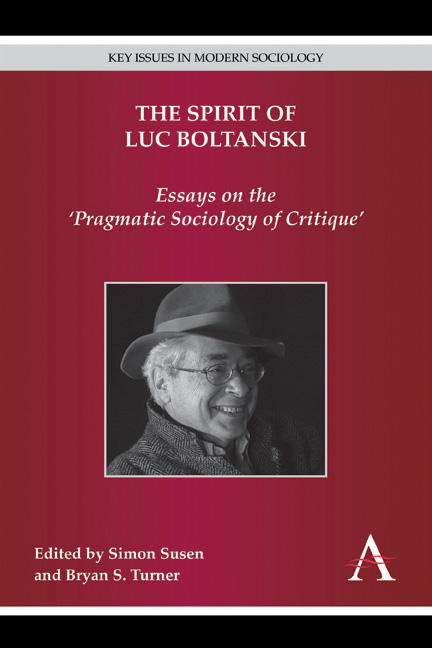Book contents
- Frontmatter
- CONTENTS
- List of Contributors
- Preface
- Part I Introductory Remarks
- Part II Luc Boltanski and (Post-) Classical Sociology
- Part III Luc Boltanski and Pragmatism
- Part IV Luc Boltanski and Critique
- Part V Luc Boltanski and Critical Sociology
- Part VI Luc Boltanski and Political Sociology
- Part VII Luc Boltanski and Contemporary Issues
- 18 Arranging the Irreversible: The Female Condition and Contradiction
- 19 Luc Boltanski and the Gift: Beyond Love, beyond Suspicion…?
- 20 The World of Worth in the Transhuman Condition: Prolegomena to a Proactionary Sociology
- 21 Luc Boltanski and the Problem of Time: Notes towards a Pragmatic Sociology of the Future
- Part VIII Luc Boltanski in Conversation
- Part IX Luc Boltanski and His Critics
- Index of Names
- Index of Subjects
20 - The World of Worth in the Transhuman Condition: Prolegomena to a Proactionary Sociology
from Part VII - Luc Boltanski and Contemporary Issues
Published online by Cambridge University Press: 05 December 2014
- Frontmatter
- CONTENTS
- List of Contributors
- Preface
- Part I Introductory Remarks
- Part II Luc Boltanski and (Post-) Classical Sociology
- Part III Luc Boltanski and Pragmatism
- Part IV Luc Boltanski and Critique
- Part V Luc Boltanski and Critical Sociology
- Part VI Luc Boltanski and Political Sociology
- Part VII Luc Boltanski and Contemporary Issues
- 18 Arranging the Irreversible: The Female Condition and Contradiction
- 19 Luc Boltanski and the Gift: Beyond Love, beyond Suspicion…?
- 20 The World of Worth in the Transhuman Condition: Prolegomena to a Proactionary Sociology
- 21 Luc Boltanski and the Problem of Time: Notes towards a Pragmatic Sociology of the Future
- Part VIII Luc Boltanski in Conversation
- Part IX Luc Boltanski and His Critics
- Index of Names
- Index of Subjects
Summary
In Search of a Common Ontology of Value
While they may not wish to put it quite this way, Boltanski and Thévenot's On Justification (2006 [1991]) marks a triumph for economic reasoning within sociology. Although the six polities, or ‘worlds of worth’, that they present derive value from quite different sources, each world is subject to the same general accounting principles, such that one can compare how the worlds allocate costs and benefits to sustain their respective conceptions of value. Indeed, the very possibility of critique appears to require this capacity. (I shall return to this point below.) The general principles behind the polities are simple but clever: each world presupposes a sense of ‘common humanity’ that is distributed across variously endowed individuals who are ordered according to the polity's guiding value. It follows that, for each person's common humanity to be realized, some sort of redistribution is required. The polity's defining activities revolve around this task, the ongoing achievement of which constitutes ‘justice’ for that polity. In this chapter, I plan to push this framework to the breaking point, challenging the integrity of the ‘Lockean individual’ that remains the normative locus of Boltanski's sense of ‘the human’. On the other side of this challenge, in the second half of this essay, is a sketch of how one may conceptualize the ‘world of worth’ in what I characterize as ‘the transhuman condition’.
Boltanski and Thévenot introduce the neat concept of ‘investment formula’ to capture how each world specifies, so to speak, the business of justice. Here they admit the influence of John Rawls's ‘difference principle’ (1971), which justifies persistent inequalities only if they serve to benefit disadvantaged members of the polity – say, either by increasing (social-democratic style) or decreasing (free-market style) taxes on the rich, in order to improve – directly or indirectly – the life conditions of the poor without necessarily ever making the poor rich (Boltanski and Thévenot, 2006 [1991]: 15).
- Type
- Chapter
- Information
- The Spirit of Luc BoltanskiEssays on the 'Pragmatic Sociology of Critique', pp. 501 - 516Publisher: Anthem PressPrint publication year: 2014

